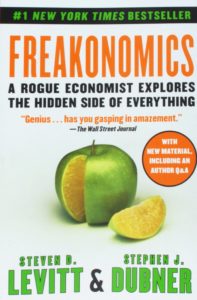
Numbers tend to lie less badly than people do.
I am little behind the curve on this one. The book was originally published in 2005. I have heard it referenced many times thought the years. I finally read it in 2019.
I enjoyed this book a lot. In fact, it made me wonder if I had missed my intended calling as a psychiatry-economics-sociologist. The book takes on multiple sets of assumptions and asks, “Is common thought, factual thought?” or “Is there a better explanation for this?”
Here are a few of the quotes I noted along the way:
- Morality, it could be argued, represents the way that people would like the world to work – whereas economics represents how it actually does work.
- Incentives are the cornerstone of modern life. And understanding them – or, often, ferreting them out – is the key to solving just about any riddle.
- The conventional wisdom is often wrong.
- Dramatic effects often have distant, even subtle causes.
- There is nothing like the sheer power of numbers to scrub away layers of confusion and contradiction.
- An incentive is simply a means of urging people to do more of a good thing and less of a bad thing.
- There are three basic flavors of incentive: economic, social, and moral.
- “A thing worth having is a thing worth cheating for.” – W. C. Fields
- Just because a question has never been asked does not make it good.
- Immutable law of labor: when there are a lot of people willing and able to do a job, that job doesn’t pay well.
- “The risks that scare people and the risks that kill people are very different” – Peter Sandman
- “Risks that you control are much less a source of outrage than risks that are our of your control.” – Peter Sandman
- Numbers tend to lie less badly than people do.
